Organisational Behaviour Report: A David & Co Limited Analysis, UK
VerifiedAdded on 2020/11/23
|19
|5650
|110
Report
AI Summary
This report provides a comprehensive analysis of organisational behaviour, focusing on the case of A David & Co Limited, a UK-based retail grocery business. The report begins by defining organisational behaviour and its importance in understanding human interactions within a company. It then delves into the concept of organisational culture, exploring Handy's typology of power, role, task, and person cultures, and their impact on employee behaviour and performance. The report further examines organisational power and politics, using French and Raven's theory to analyze different types of power and their influence on individuals and teams. The analysis extends to motivational theories, covering content theories like Maslow's Hierarchy of Needs and process theories such as Vroom's Expectancy Theory. The report also discusses various motivational techniques and their application in the workplace. Finally, the report addresses team dynamics, types of teams, and Tuckman and Jensen's model of team development, along with organisational concepts and philosophies like the path-goal theory, to provide a holistic understanding of organisational behaviour within the context of the selected company.
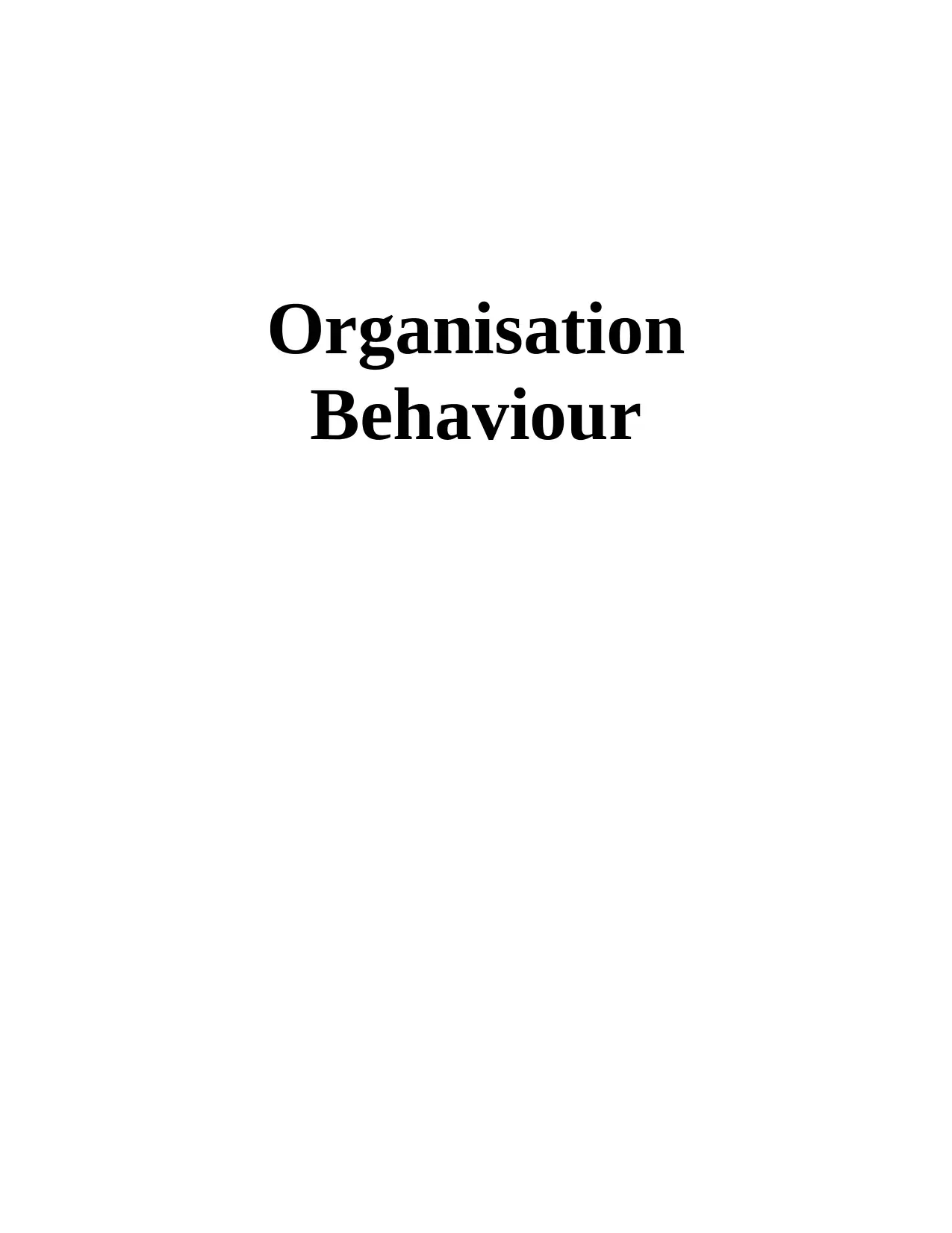
Organisation
Behaviour
Behaviour
Paraphrase This Document
Need a fresh take? Get an instant paraphrase of this document with our AI Paraphraser
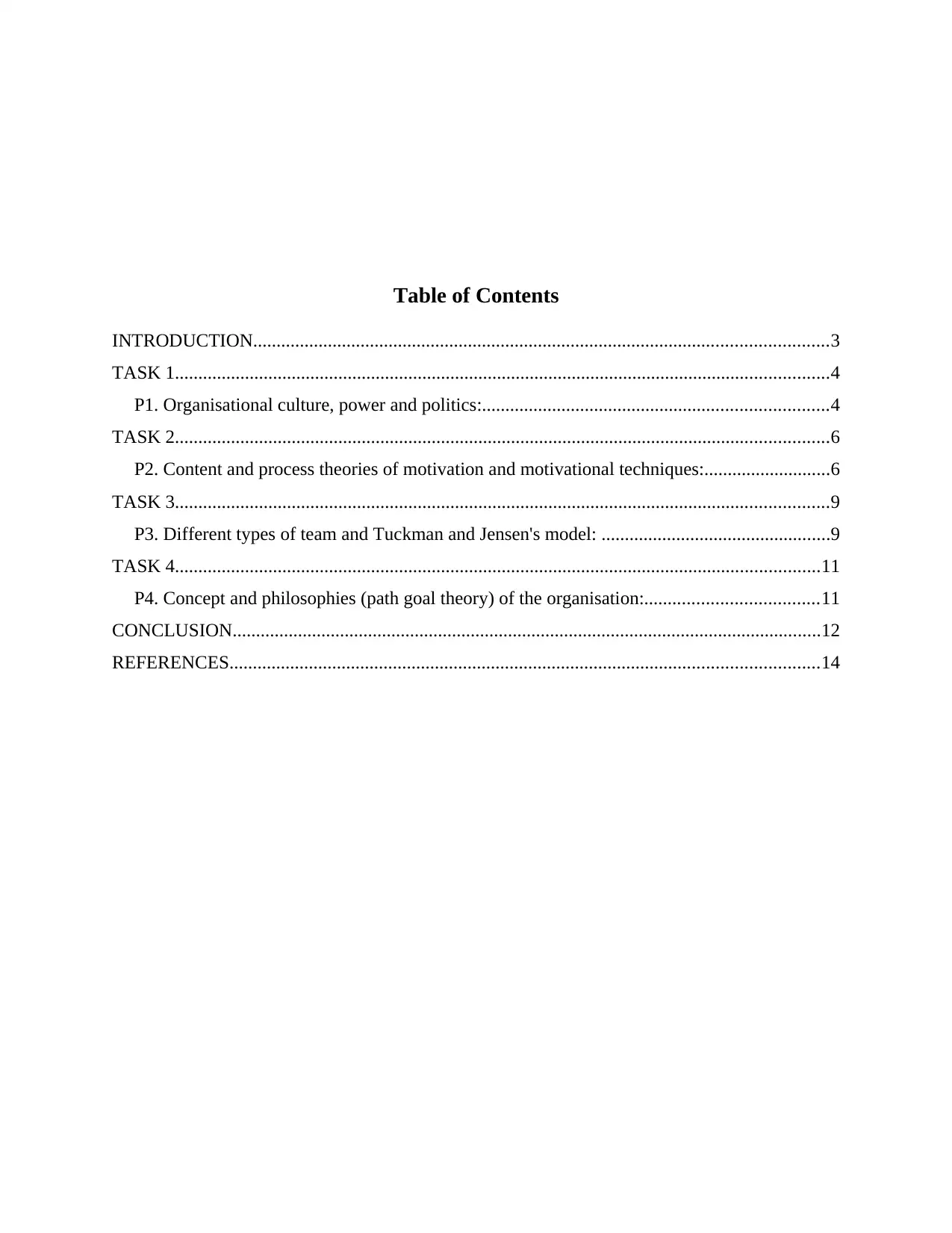
Table of Contents
INTRODUCTION...........................................................................................................................3
TASK 1............................................................................................................................................4
P1. Organisational culture, power and politics:..........................................................................4
TASK 2............................................................................................................................................6
P2. Content and process theories of motivation and motivational techniques:...........................6
TASK 3............................................................................................................................................9
P3. Different types of team and Tuckman and Jensen's model: .................................................9
TASK 4..........................................................................................................................................11
P4. Concept and philosophies (path goal theory) of the organisation:.....................................11
CONCLUSION..............................................................................................................................12
REFERENCES..............................................................................................................................14
INTRODUCTION...........................................................................................................................3
TASK 1............................................................................................................................................4
P1. Organisational culture, power and politics:..........................................................................4
TASK 2............................................................................................................................................6
P2. Content and process theories of motivation and motivational techniques:...........................6
TASK 3............................................................................................................................................9
P3. Different types of team and Tuckman and Jensen's model: .................................................9
TASK 4..........................................................................................................................................11
P4. Concept and philosophies (path goal theory) of the organisation:.....................................11
CONCLUSION..............................................................................................................................12
REFERENCES..............................................................................................................................14
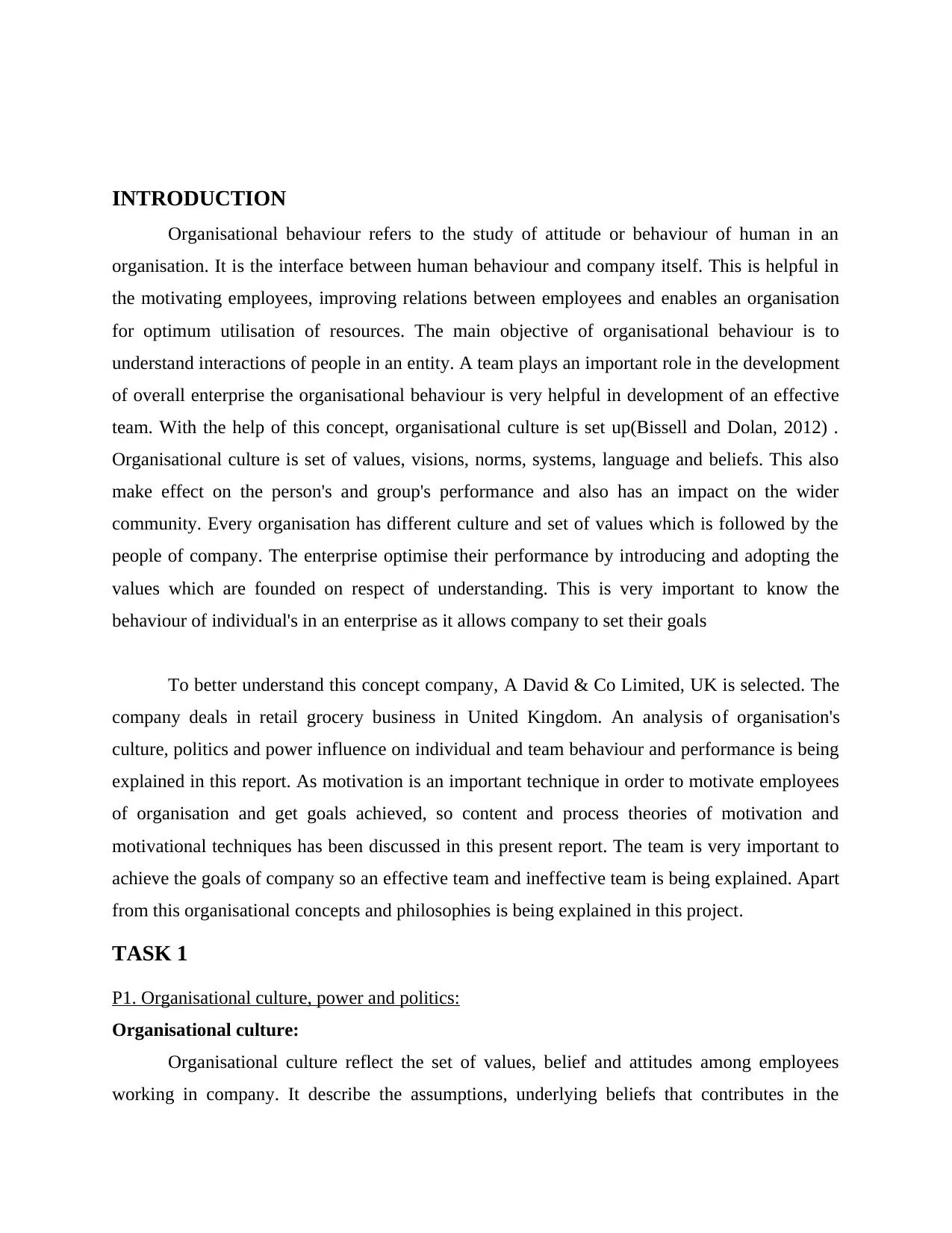
INTRODUCTION
Organisational behaviour refers to the study of attitude or behaviour of human in an
organisation. It is the interface between human behaviour and company itself. This is helpful in
the motivating employees, improving relations between employees and enables an organisation
for optimum utilisation of resources. The main objective of organisational behaviour is to
understand interactions of people in an entity. A team plays an important role in the development
of overall enterprise the organisational behaviour is very helpful in development of an effective
team. With the help of this concept, organisational culture is set up(Bissell and Dolan, 2012) .
Organisational culture is set of values, visions, norms, systems, language and beliefs. This also
make effect on the person's and group's performance and also has an impact on the wider
community. Every organisation has different culture and set of values which is followed by the
people of company. The enterprise optimise their performance by introducing and adopting the
values which are founded on respect of understanding. This is very important to know the
behaviour of individual's in an enterprise as it allows company to set their goals
To better understand this concept company, A David & Co Limited, UK is selected. The
company deals in retail grocery business in United Kingdom. An analysis of organisation's
culture, politics and power influence on individual and team behaviour and performance is being
explained in this report. As motivation is an important technique in order to motivate employees
of organisation and get goals achieved, so content and process theories of motivation and
motivational techniques has been discussed in this present report. The team is very important to
achieve the goals of company so an effective team and ineffective team is being explained. Apart
from this organisational concepts and philosophies is being explained in this project.
TASK 1
P1. Organisational culture, power and politics:
Organisational culture:
Organisational culture reflect the set of values, belief and attitudes among employees
working in company. It describe the assumptions, underlying beliefs that contributes in the
Organisational behaviour refers to the study of attitude or behaviour of human in an
organisation. It is the interface between human behaviour and company itself. This is helpful in
the motivating employees, improving relations between employees and enables an organisation
for optimum utilisation of resources. The main objective of organisational behaviour is to
understand interactions of people in an entity. A team plays an important role in the development
of overall enterprise the organisational behaviour is very helpful in development of an effective
team. With the help of this concept, organisational culture is set up(Bissell and Dolan, 2012) .
Organisational culture is set of values, visions, norms, systems, language and beliefs. This also
make effect on the person's and group's performance and also has an impact on the wider
community. Every organisation has different culture and set of values which is followed by the
people of company. The enterprise optimise their performance by introducing and adopting the
values which are founded on respect of understanding. This is very important to know the
behaviour of individual's in an enterprise as it allows company to set their goals
To better understand this concept company, A David & Co Limited, UK is selected. The
company deals in retail grocery business in United Kingdom. An analysis of organisation's
culture, politics and power influence on individual and team behaviour and performance is being
explained in this report. As motivation is an important technique in order to motivate employees
of organisation and get goals achieved, so content and process theories of motivation and
motivational techniques has been discussed in this present report. The team is very important to
achieve the goals of company so an effective team and ineffective team is being explained. Apart
from this organisational concepts and philosophies is being explained in this project.
TASK 1
P1. Organisational culture, power and politics:
Organisational culture:
Organisational culture reflect the set of values, belief and attitudes among employees
working in company. It describe the assumptions, underlying beliefs that contributes in the
⊘ This is a preview!⊘
Do you want full access?
Subscribe today to unlock all pages.

Trusted by 1+ million students worldwide
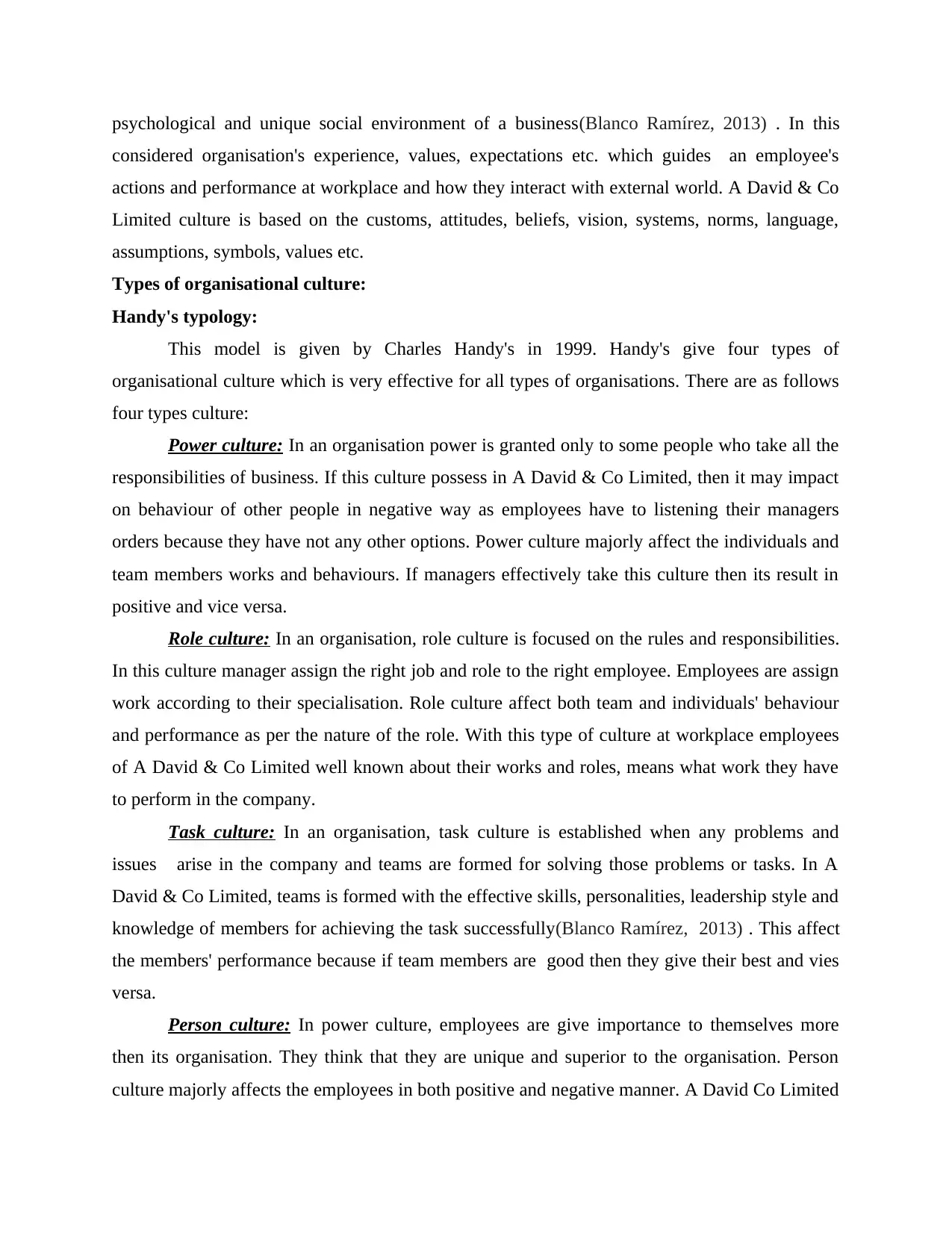
psychological and unique social environment of a business(Blanco Ramírez, 2013) . In this
considered organisation's experience, values, expectations etc. which guides an employee's
actions and performance at workplace and how they interact with external world. A David & Co
Limited culture is based on the customs, attitudes, beliefs, vision, systems, norms, language,
assumptions, symbols, values etc.
Types of organisational culture:
Handy's typology:
This model is given by Charles Handy's in 1999. Handy's give four types of
organisational culture which is very effective for all types of organisations. There are as follows
four types culture:
Power culture: In an organisation power is granted only to some people who take all the
responsibilities of business. If this culture possess in A David & Co Limited, then it may impact
on behaviour of other people in negative way as employees have to listening their managers
orders because they have not any other options. Power culture majorly affect the individuals and
team members works and behaviours. If managers effectively take this culture then its result in
positive and vice versa.
Role culture: In an organisation, role culture is focused on the rules and responsibilities.
In this culture manager assign the right job and role to the right employee. Employees are assign
work according to their specialisation. Role culture affect both team and individuals' behaviour
and performance as per the nature of the role. With this type of culture at workplace employees
of A David & Co Limited well known about their works and roles, means what work they have
to perform in the company.
Task culture: In an organisation, task culture is established when any problems and
issues arise in the company and teams are formed for solving those problems or tasks. In A
David & Co Limited, teams is formed with the effective skills, personalities, leadership style and
knowledge of members for achieving the task successfully(Blanco Ramírez, 2013) . This affect
the members' performance because if team members are good then they give their best and vies
versa.
Person culture: In power culture, employees are give importance to themselves more
then its organisation. They think that they are unique and superior to the organisation. Person
culture majorly affects the employees in both positive and negative manner. A David Co Limited
considered organisation's experience, values, expectations etc. which guides an employee's
actions and performance at workplace and how they interact with external world. A David & Co
Limited culture is based on the customs, attitudes, beliefs, vision, systems, norms, language,
assumptions, symbols, values etc.
Types of organisational culture:
Handy's typology:
This model is given by Charles Handy's in 1999. Handy's give four types of
organisational culture which is very effective for all types of organisations. There are as follows
four types culture:
Power culture: In an organisation power is granted only to some people who take all the
responsibilities of business. If this culture possess in A David & Co Limited, then it may impact
on behaviour of other people in negative way as employees have to listening their managers
orders because they have not any other options. Power culture majorly affect the individuals and
team members works and behaviours. If managers effectively take this culture then its result in
positive and vice versa.
Role culture: In an organisation, role culture is focused on the rules and responsibilities.
In this culture manager assign the right job and role to the right employee. Employees are assign
work according to their specialisation. Role culture affect both team and individuals' behaviour
and performance as per the nature of the role. With this type of culture at workplace employees
of A David & Co Limited well known about their works and roles, means what work they have
to perform in the company.
Task culture: In an organisation, task culture is established when any problems and
issues arise in the company and teams are formed for solving those problems or tasks. In A
David & Co Limited, teams is formed with the effective skills, personalities, leadership style and
knowledge of members for achieving the task successfully(Blanco Ramírez, 2013) . This affect
the members' performance because if team members are good then they give their best and vies
versa.
Person culture: In power culture, employees are give importance to themselves more
then its organisation. They think that they are unique and superior to the organisation. Person
culture majorly affects the employees in both positive and negative manner. A David Co Limited
Paraphrase This Document
Need a fresh take? Get an instant paraphrase of this document with our AI Paraphraser
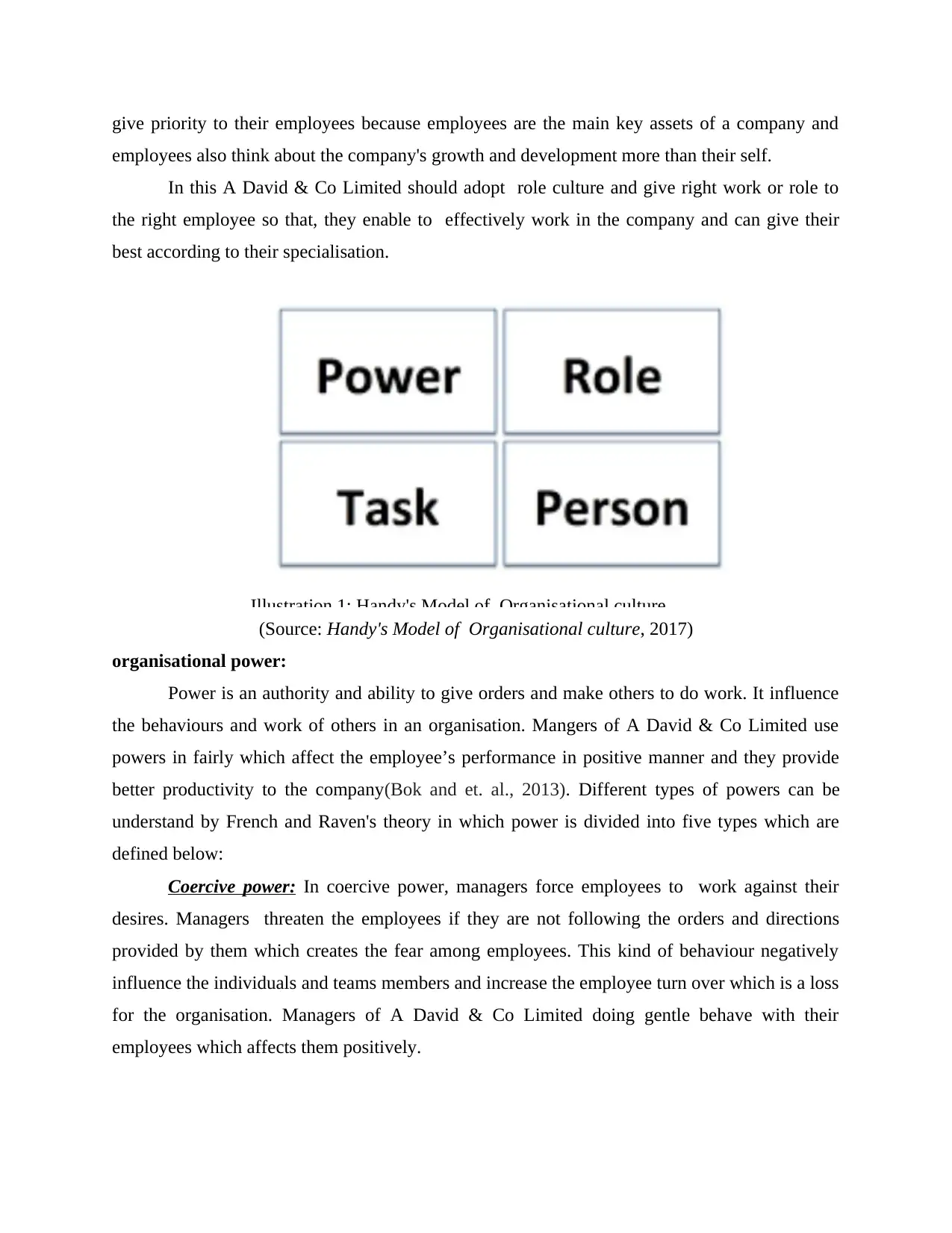
give priority to their employees because employees are the main key assets of a company and
employees also think about the company's growth and development more than their self.
In this A David & Co Limited should adopt role culture and give right work or role to
the right employee so that, they enable to effectively work in the company and can give their
best according to their specialisation.
(Source: Handy's Model of Organisational culture, 2017)
organisational power:
Power is an authority and ability to give orders and make others to do work. It influence
the behaviours and work of others in an organisation. Mangers of A David & Co Limited use
powers in fairly which affect the employee’s performance in positive manner and they provide
better productivity to the company(Bok and et. al., 2013). Different types of powers can be
understand by French and Raven's theory in which power is divided into five types which are
defined below:
Coercive power: In coercive power, managers force employees to work against their
desires. Managers threaten the employees if they are not following the orders and directions
provided by them which creates the fear among employees. This kind of behaviour negatively
influence the individuals and teams members and increase the employee turn over which is a loss
for the organisation. Managers of A David & Co Limited doing gentle behave with their
employees which affects them positively.
Illustration 1: Handy's Model of Organisational culture
employees also think about the company's growth and development more than their self.
In this A David & Co Limited should adopt role culture and give right work or role to
the right employee so that, they enable to effectively work in the company and can give their
best according to their specialisation.
(Source: Handy's Model of Organisational culture, 2017)
organisational power:
Power is an authority and ability to give orders and make others to do work. It influence
the behaviours and work of others in an organisation. Mangers of A David & Co Limited use
powers in fairly which affect the employee’s performance in positive manner and they provide
better productivity to the company(Bok and et. al., 2013). Different types of powers can be
understand by French and Raven's theory in which power is divided into five types which are
defined below:
Coercive power: In coercive power, managers force employees to work against their
desires. Managers threaten the employees if they are not following the orders and directions
provided by them which creates the fear among employees. This kind of behaviour negatively
influence the individuals and teams members and increase the employee turn over which is a loss
for the organisation. Managers of A David & Co Limited doing gentle behave with their
employees which affects them positively.
Illustration 1: Handy's Model of Organisational culture
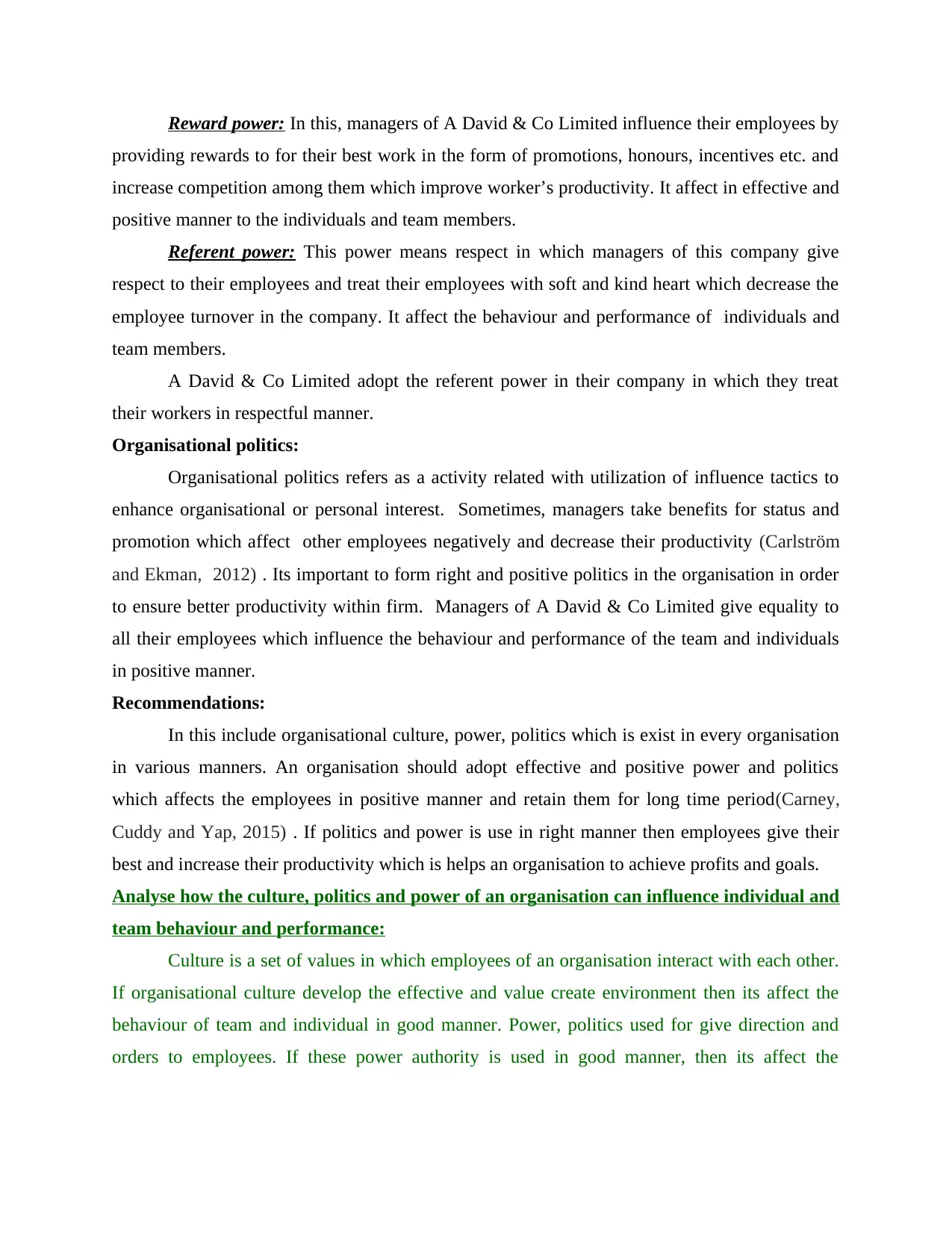
Reward power: In this, managers of A David & Co Limited influence their employees by
providing rewards to for their best work in the form of promotions, honours, incentives etc. and
increase competition among them which improve worker’s productivity. It affect in effective and
positive manner to the individuals and team members.
Referent power: This power means respect in which managers of this company give
respect to their employees and treat their employees with soft and kind heart which decrease the
employee turnover in the company. It affect the behaviour and performance of individuals and
team members.
A David & Co Limited adopt the referent power in their company in which they treat
their workers in respectful manner.
Organisational politics:
Organisational politics refers as a activity related with utilization of influence tactics to
enhance organisational or personal interest. Sometimes, managers take benefits for status and
promotion which affect other employees negatively and decrease their productivity (Carlström
and Ekman, 2012) . Its important to form right and positive politics in the organisation in order
to ensure better productivity within firm. Managers of A David & Co Limited give equality to
all their employees which influence the behaviour and performance of the team and individuals
in positive manner.
Recommendations:
In this include organisational culture, power, politics which is exist in every organisation
in various manners. An organisation should adopt effective and positive power and politics
which affects the employees in positive manner and retain them for long time period(Carney,
Cuddy and Yap, 2015) . If politics and power is use in right manner then employees give their
best and increase their productivity which is helps an organisation to achieve profits and goals.
Analyse how the culture, politics and power of an organisation can influence individual and
team behaviour and performance:
Culture is a set of values in which employees of an organisation interact with each other.
If organisational culture develop the effective and value create environment then its affect the
behaviour of team and individual in good manner. Power, politics used for give direction and
orders to employees. If these power authority is used in good manner, then its affect the
providing rewards to for their best work in the form of promotions, honours, incentives etc. and
increase competition among them which improve worker’s productivity. It affect in effective and
positive manner to the individuals and team members.
Referent power: This power means respect in which managers of this company give
respect to their employees and treat their employees with soft and kind heart which decrease the
employee turnover in the company. It affect the behaviour and performance of individuals and
team members.
A David & Co Limited adopt the referent power in their company in which they treat
their workers in respectful manner.
Organisational politics:
Organisational politics refers as a activity related with utilization of influence tactics to
enhance organisational or personal interest. Sometimes, managers take benefits for status and
promotion which affect other employees negatively and decrease their productivity (Carlström
and Ekman, 2012) . Its important to form right and positive politics in the organisation in order
to ensure better productivity within firm. Managers of A David & Co Limited give equality to
all their employees which influence the behaviour and performance of the team and individuals
in positive manner.
Recommendations:
In this include organisational culture, power, politics which is exist in every organisation
in various manners. An organisation should adopt effective and positive power and politics
which affects the employees in positive manner and retain them for long time period(Carney,
Cuddy and Yap, 2015) . If politics and power is use in right manner then employees give their
best and increase their productivity which is helps an organisation to achieve profits and goals.
Analyse how the culture, politics and power of an organisation can influence individual and
team behaviour and performance:
Culture is a set of values in which employees of an organisation interact with each other.
If organisational culture develop the effective and value create environment then its affect the
behaviour of team and individual in good manner. Power, politics used for give direction and
orders to employees. If these power authority is used in good manner, then its affect the
⊘ This is a preview!⊘
Do you want full access?
Subscribe today to unlock all pages.

Trusted by 1+ million students worldwide
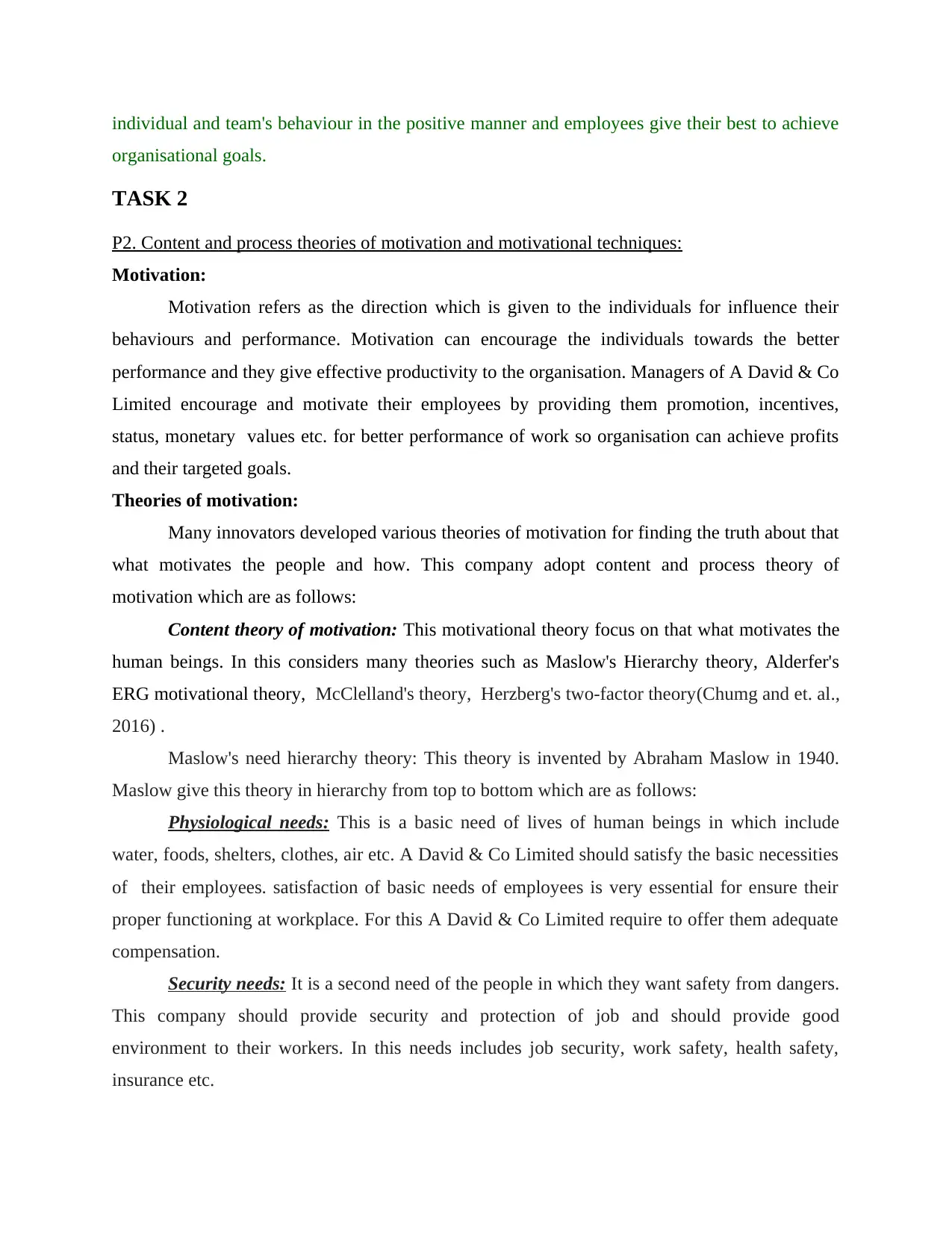
individual and team's behaviour in the positive manner and employees give their best to achieve
organisational goals.
TASK 2
P2. Content and process theories of motivation and motivational techniques:
Motivation:
Motivation refers as the direction which is given to the individuals for influence their
behaviours and performance. Motivation can encourage the individuals towards the better
performance and they give effective productivity to the organisation. Managers of A David & Co
Limited encourage and motivate their employees by providing them promotion, incentives,
status, monetary values etc. for better performance of work so organisation can achieve profits
and their targeted goals.
Theories of motivation:
Many innovators developed various theories of motivation for finding the truth about that
what motivates the people and how. This company adopt content and process theory of
motivation which are as follows:
Content theory of motivation: This motivational theory focus on that what motivates the
human beings. In this considers many theories such as Maslow's Hierarchy theory, Alderfer's
ERG motivational theory, McClelland's theory, Herzberg's two-factor theory(Chumg and et. al.,
2016) .
Maslow's need hierarchy theory: This theory is invented by Abraham Maslow in 1940.
Maslow give this theory in hierarchy from top to bottom which are as follows:
Physiological needs: This is a basic need of lives of human beings in which include
water, foods, shelters, clothes, air etc. A David & Co Limited should satisfy the basic necessities
of their employees. satisfaction of basic needs of employees is very essential for ensure their
proper functioning at workplace. For this A David & Co Limited require to offer them adequate
compensation.
Security needs: It is a second need of the people in which they want safety from dangers.
This company should provide security and protection of job and should provide good
environment to their workers. In this needs includes job security, work safety, health safety,
insurance etc.
organisational goals.
TASK 2
P2. Content and process theories of motivation and motivational techniques:
Motivation:
Motivation refers as the direction which is given to the individuals for influence their
behaviours and performance. Motivation can encourage the individuals towards the better
performance and they give effective productivity to the organisation. Managers of A David & Co
Limited encourage and motivate their employees by providing them promotion, incentives,
status, monetary values etc. for better performance of work so organisation can achieve profits
and their targeted goals.
Theories of motivation:
Many innovators developed various theories of motivation for finding the truth about that
what motivates the people and how. This company adopt content and process theory of
motivation which are as follows:
Content theory of motivation: This motivational theory focus on that what motivates the
human beings. In this considers many theories such as Maslow's Hierarchy theory, Alderfer's
ERG motivational theory, McClelland's theory, Herzberg's two-factor theory(Chumg and et. al.,
2016) .
Maslow's need hierarchy theory: This theory is invented by Abraham Maslow in 1940.
Maslow give this theory in hierarchy from top to bottom which are as follows:
Physiological needs: This is a basic need of lives of human beings in which include
water, foods, shelters, clothes, air etc. A David & Co Limited should satisfy the basic necessities
of their employees. satisfaction of basic needs of employees is very essential for ensure their
proper functioning at workplace. For this A David & Co Limited require to offer them adequate
compensation.
Security needs: It is a second need of the people in which they want safety from dangers.
This company should provide security and protection of job and should provide good
environment to their workers. In this needs includes job security, work safety, health safety,
insurance etc.
Paraphrase This Document
Need a fresh take? Get an instant paraphrase of this document with our AI Paraphraser
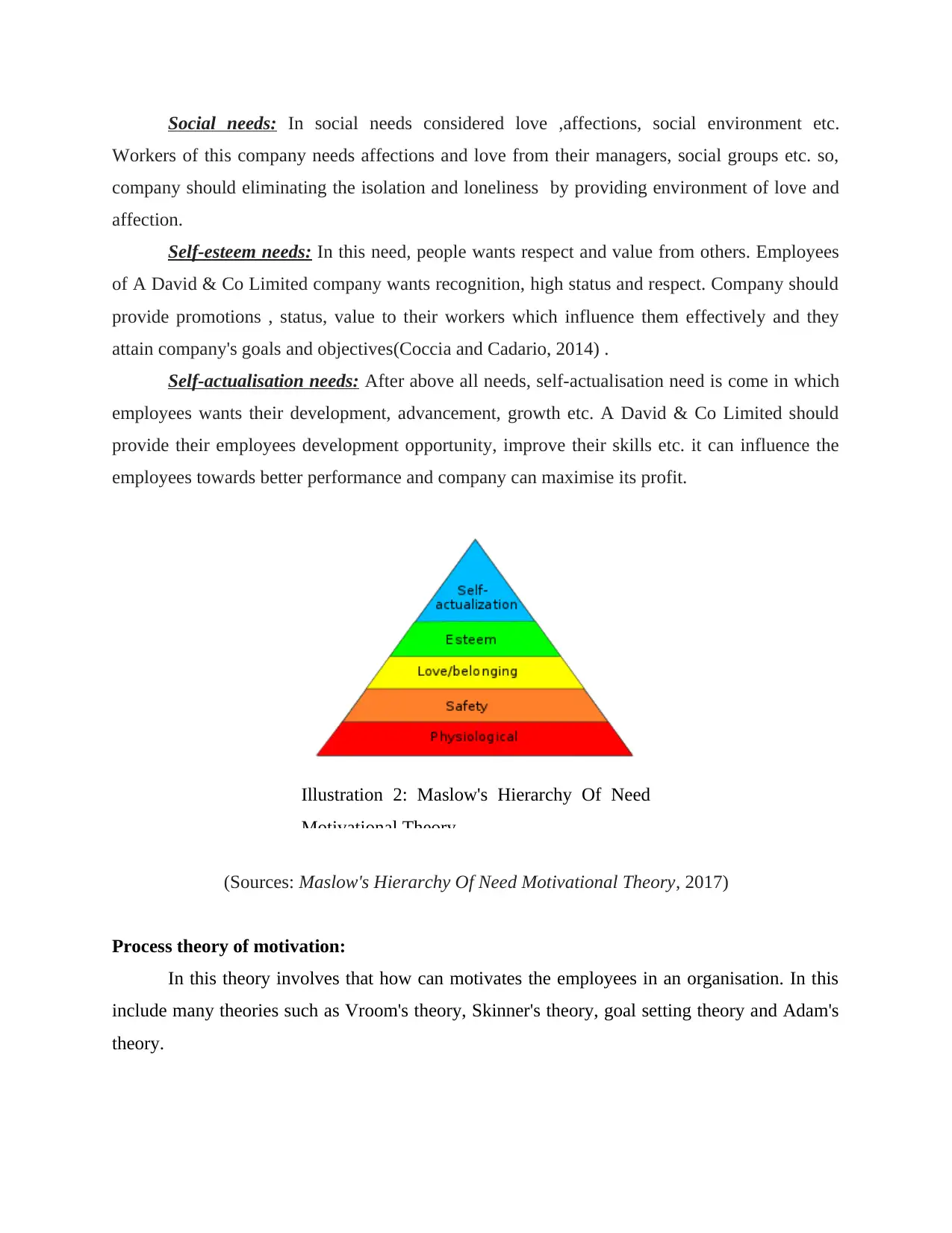
Social needs: In social needs considered love ,affections, social environment etc.
Workers of this company needs affections and love from their managers, social groups etc. so,
company should eliminating the isolation and loneliness by providing environment of love and
affection.
Self-esteem needs: In this need, people wants respect and value from others. Employees
of A David & Co Limited company wants recognition, high status and respect. Company should
provide promotions , status, value to their workers which influence them effectively and they
attain company's goals and objectives(Coccia and Cadario, 2014) .
Self-actualisation needs: After above all needs, self-actualisation need is come in which
employees wants their development, advancement, growth etc. A David & Co Limited should
provide their employees development opportunity, improve their skills etc. it can influence the
employees towards better performance and company can maximise its profit.
(Sources: Maslow's Hierarchy Of Need Motivational Theory, 2017)
Process theory of motivation:
In this theory involves that how can motivates the employees in an organisation. In this
include many theories such as Vroom's theory, Skinner's theory, goal setting theory and Adam's
theory.
Illustration 2: Maslow's Hierarchy Of Need
Motivational Theory
Workers of this company needs affections and love from their managers, social groups etc. so,
company should eliminating the isolation and loneliness by providing environment of love and
affection.
Self-esteem needs: In this need, people wants respect and value from others. Employees
of A David & Co Limited company wants recognition, high status and respect. Company should
provide promotions , status, value to their workers which influence them effectively and they
attain company's goals and objectives(Coccia and Cadario, 2014) .
Self-actualisation needs: After above all needs, self-actualisation need is come in which
employees wants their development, advancement, growth etc. A David & Co Limited should
provide their employees development opportunity, improve their skills etc. it can influence the
employees towards better performance and company can maximise its profit.
(Sources: Maslow's Hierarchy Of Need Motivational Theory, 2017)
Process theory of motivation:
In this theory involves that how can motivates the employees in an organisation. In this
include many theories such as Vroom's theory, Skinner's theory, goal setting theory and Adam's
theory.
Illustration 2: Maslow's Hierarchy Of Need
Motivational Theory
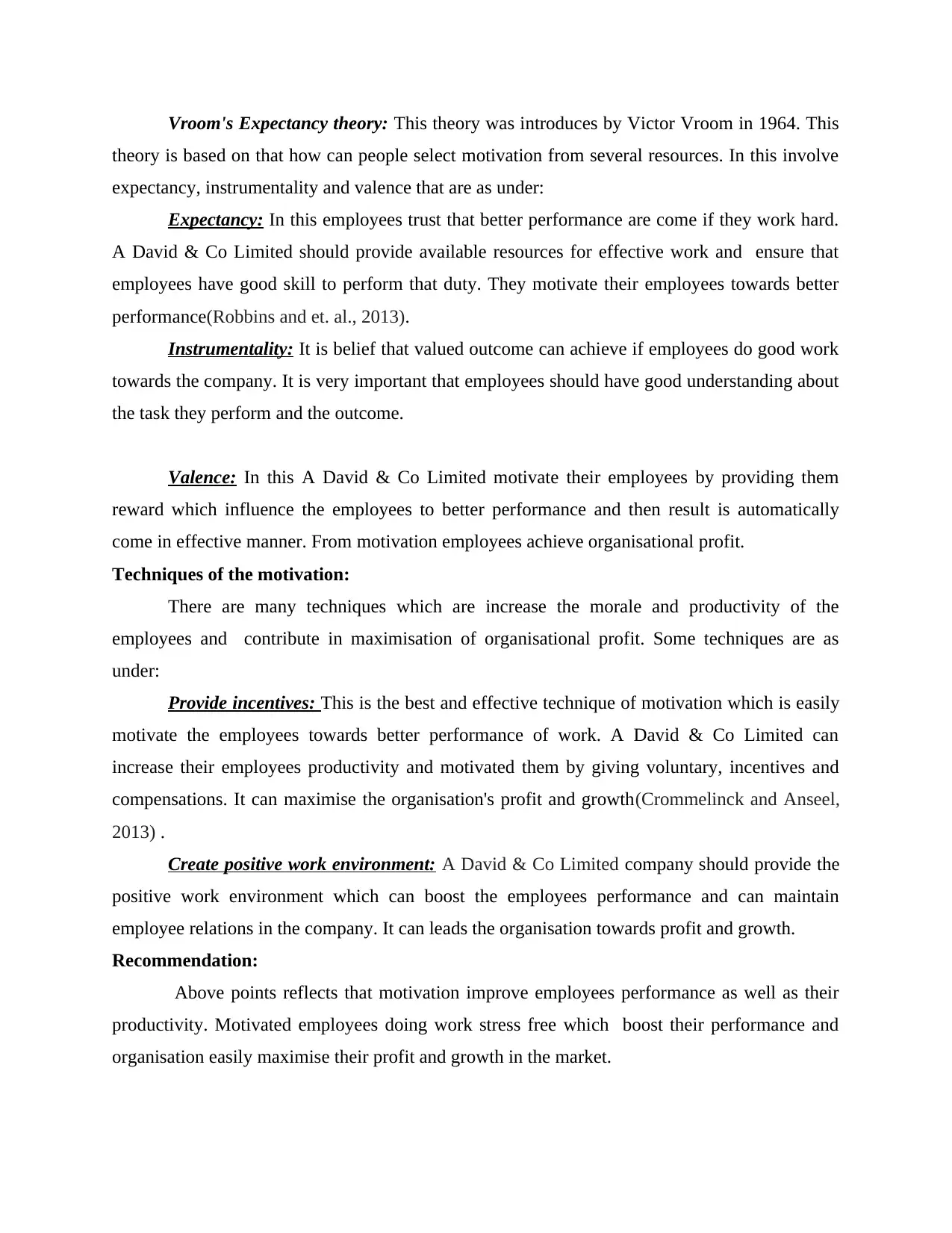
Vroom's Expectancy theory: This theory was introduces by Victor Vroom in 1964. This
theory is based on that how can people select motivation from several resources. In this involve
expectancy, instrumentality and valence that are as under:
Expectancy: In this employees trust that better performance are come if they work hard.
A David & Co Limited should provide available resources for effective work and ensure that
employees have good skill to perform that duty. They motivate their employees towards better
performance(Robbins and et. al., 2013).
Instrumentality: It is belief that valued outcome can achieve if employees do good work
towards the company. It is very important that employees should have good understanding about
the task they perform and the outcome.
Valence: In this A David & Co Limited motivate their employees by providing them
reward which influence the employees to better performance and then result is automatically
come in effective manner. From motivation employees achieve organisational profit.
Techniques of the motivation:
There are many techniques which are increase the morale and productivity of the
employees and contribute in maximisation of organisational profit. Some techniques are as
under:
Provide incentives: This is the best and effective technique of motivation which is easily
motivate the employees towards better performance of work. A David & Co Limited can
increase their employees productivity and motivated them by giving voluntary, incentives and
compensations. It can maximise the organisation's profit and growth(Crommelinck and Anseel,
2013) .
Create positive work environment: A David & Co Limited company should provide the
positive work environment which can boost the employees performance and can maintain
employee relations in the company. It can leads the organisation towards profit and growth.
Recommendation:
Above points reflects that motivation improve employees performance as well as their
productivity. Motivated employees doing work stress free which boost their performance and
organisation easily maximise their profit and growth in the market.
theory is based on that how can people select motivation from several resources. In this involve
expectancy, instrumentality and valence that are as under:
Expectancy: In this employees trust that better performance are come if they work hard.
A David & Co Limited should provide available resources for effective work and ensure that
employees have good skill to perform that duty. They motivate their employees towards better
performance(Robbins and et. al., 2013).
Instrumentality: It is belief that valued outcome can achieve if employees do good work
towards the company. It is very important that employees should have good understanding about
the task they perform and the outcome.
Valence: In this A David & Co Limited motivate their employees by providing them
reward which influence the employees to better performance and then result is automatically
come in effective manner. From motivation employees achieve organisational profit.
Techniques of the motivation:
There are many techniques which are increase the morale and productivity of the
employees and contribute in maximisation of organisational profit. Some techniques are as
under:
Provide incentives: This is the best and effective technique of motivation which is easily
motivate the employees towards better performance of work. A David & Co Limited can
increase their employees productivity and motivated them by giving voluntary, incentives and
compensations. It can maximise the organisation's profit and growth(Crommelinck and Anseel,
2013) .
Create positive work environment: A David & Co Limited company should provide the
positive work environment which can boost the employees performance and can maintain
employee relations in the company. It can leads the organisation towards profit and growth.
Recommendation:
Above points reflects that motivation improve employees performance as well as their
productivity. Motivated employees doing work stress free which boost their performance and
organisation easily maximise their profit and growth in the market.
⊘ This is a preview!⊘
Do you want full access?
Subscribe today to unlock all pages.

Trusted by 1+ million students worldwide
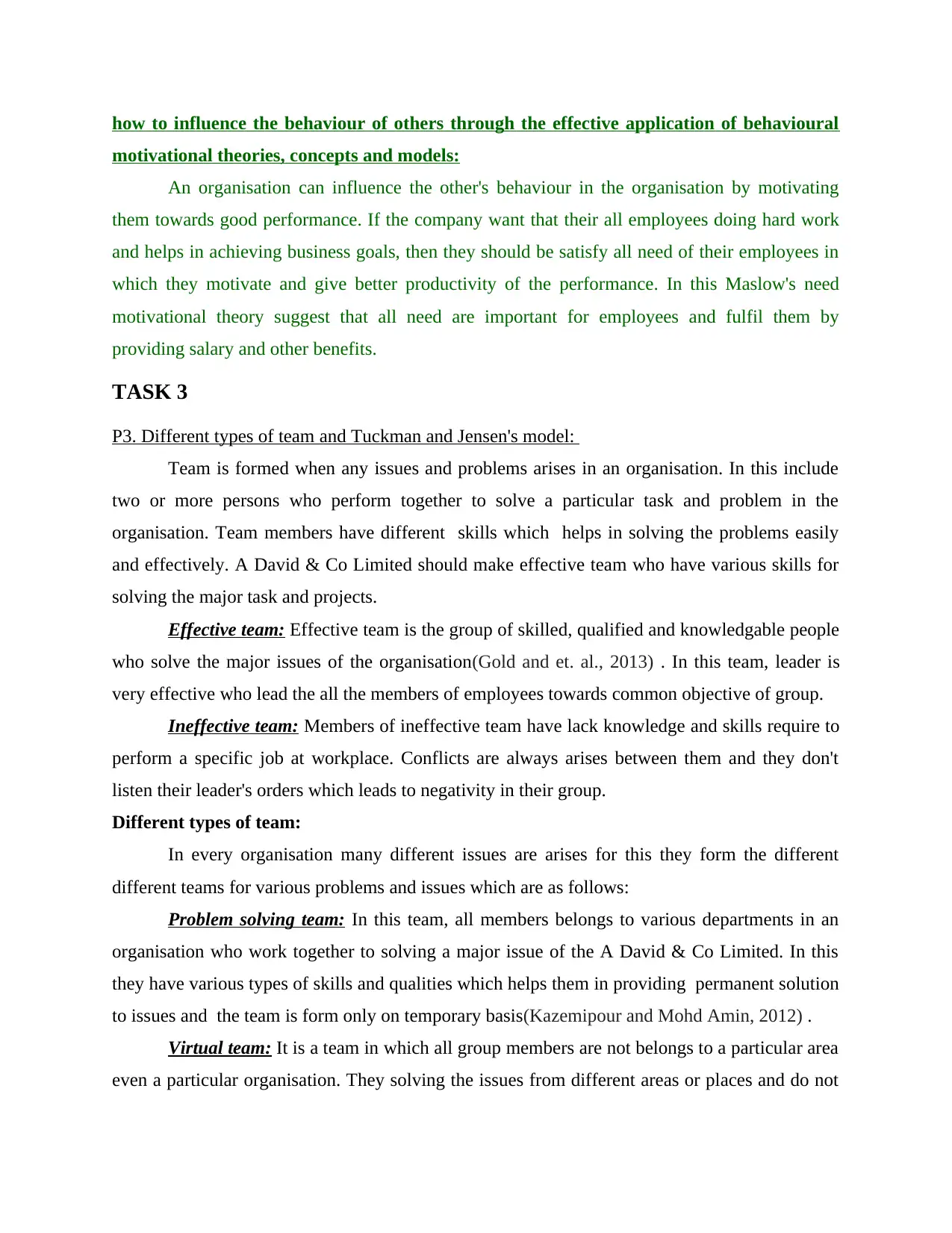
how to influence the behaviour of others through the effective application of behavioural
motivational theories, concepts and models:
An organisation can influence the other's behaviour in the organisation by motivating
them towards good performance. If the company want that their all employees doing hard work
and helps in achieving business goals, then they should be satisfy all need of their employees in
which they motivate and give better productivity of the performance. In this Maslow's need
motivational theory suggest that all need are important for employees and fulfil them by
providing salary and other benefits.
TASK 3
P3. Different types of team and Tuckman and Jensen's model:
Team is formed when any issues and problems arises in an organisation. In this include
two or more persons who perform together to solve a particular task and problem in the
organisation. Team members have different skills which helps in solving the problems easily
and effectively. A David & Co Limited should make effective team who have various skills for
solving the major task and projects.
Effective team: Effective team is the group of skilled, qualified and knowledgable people
who solve the major issues of the organisation(Gold and et. al., 2013) . In this team, leader is
very effective who lead the all the members of employees towards common objective of group.
Ineffective team: Members of ineffective team have lack knowledge and skills require to
perform a specific job at workplace. Conflicts are always arises between them and they don't
listen their leader's orders which leads to negativity in their group.
Different types of team:
In every organisation many different issues are arises for this they form the different
different teams for various problems and issues which are as follows:
Problem solving team: In this team, all members belongs to various departments in an
organisation who work together to solving a major issue of the A David & Co Limited. In this
they have various types of skills and qualities which helps them in providing permanent solution
to issues and the team is form only on temporary basis(Kazemipour and Mohd Amin, 2012) .
Virtual team: It is a team in which all group members are not belongs to a particular area
even a particular organisation. They solving the issues from different areas or places and do not
motivational theories, concepts and models:
An organisation can influence the other's behaviour in the organisation by motivating
them towards good performance. If the company want that their all employees doing hard work
and helps in achieving business goals, then they should be satisfy all need of their employees in
which they motivate and give better productivity of the performance. In this Maslow's need
motivational theory suggest that all need are important for employees and fulfil them by
providing salary and other benefits.
TASK 3
P3. Different types of team and Tuckman and Jensen's model:
Team is formed when any issues and problems arises in an organisation. In this include
two or more persons who perform together to solve a particular task and problem in the
organisation. Team members have different skills which helps in solving the problems easily
and effectively. A David & Co Limited should make effective team who have various skills for
solving the major task and projects.
Effective team: Effective team is the group of skilled, qualified and knowledgable people
who solve the major issues of the organisation(Gold and et. al., 2013) . In this team, leader is
very effective who lead the all the members of employees towards common objective of group.
Ineffective team: Members of ineffective team have lack knowledge and skills require to
perform a specific job at workplace. Conflicts are always arises between them and they don't
listen their leader's orders which leads to negativity in their group.
Different types of team:
In every organisation many different issues are arises for this they form the different
different teams for various problems and issues which are as follows:
Problem solving team: In this team, all members belongs to various departments in an
organisation who work together to solving a major issue of the A David & Co Limited. In this
they have various types of skills and qualities which helps them in providing permanent solution
to issues and the team is form only on temporary basis(Kazemipour and Mohd Amin, 2012) .
Virtual team: It is a team in which all group members are not belongs to a particular area
even a particular organisation. They solving the issues from different areas or places and do not
Paraphrase This Document
Need a fresh take? Get an instant paraphrase of this document with our AI Paraphraser
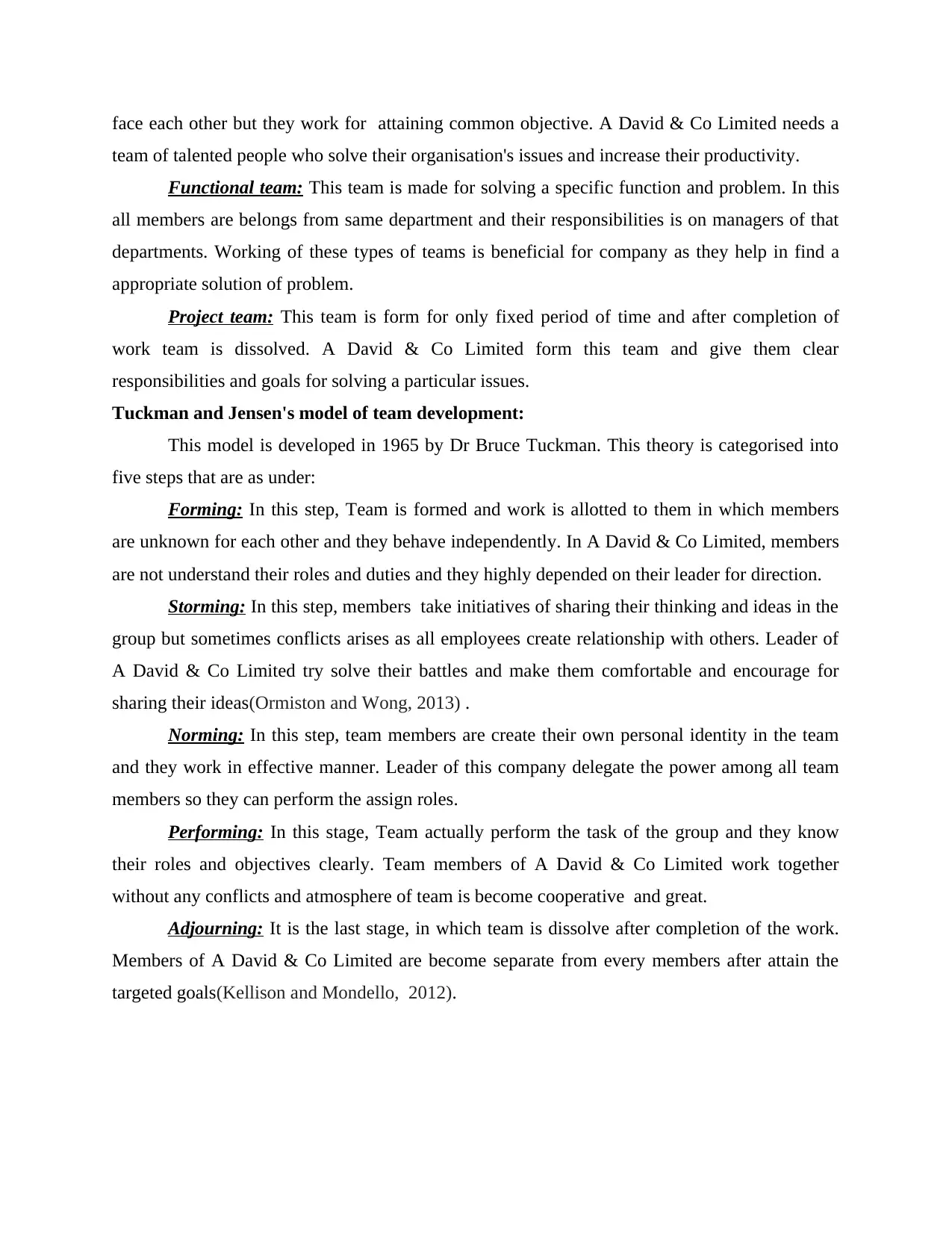
face each other but they work for attaining common objective. A David & Co Limited needs a
team of talented people who solve their organisation's issues and increase their productivity.
Functional team: This team is made for solving a specific function and problem. In this
all members are belongs from same department and their responsibilities is on managers of that
departments. Working of these types of teams is beneficial for company as they help in find a
appropriate solution of problem.
Project team: This team is form for only fixed period of time and after completion of
work team is dissolved. A David & Co Limited form this team and give them clear
responsibilities and goals for solving a particular issues.
Tuckman and Jensen's model of team development:
This model is developed in 1965 by Dr Bruce Tuckman. This theory is categorised into
five steps that are as under:
Forming: In this step, Team is formed and work is allotted to them in which members
are unknown for each other and they behave independently. In A David & Co Limited, members
are not understand their roles and duties and they highly depended on their leader for direction.
Storming: In this step, members take initiatives of sharing their thinking and ideas in the
group but sometimes conflicts arises as all employees create relationship with others. Leader of
A David & Co Limited try solve their battles and make them comfortable and encourage for
sharing their ideas(Ormiston and Wong, 2013) .
Norming: In this step, team members are create their own personal identity in the team
and they work in effective manner. Leader of this company delegate the power among all team
members so they can perform the assign roles.
Performing: In this stage, Team actually perform the task of the group and they know
their roles and objectives clearly. Team members of A David & Co Limited work together
without any conflicts and atmosphere of team is become cooperative and great.
Adjourning: It is the last stage, in which team is dissolve after completion of the work.
Members of A David & Co Limited are become separate from every members after attain the
targeted goals(Kellison and Mondello, 2012).
team of talented people who solve their organisation's issues and increase their productivity.
Functional team: This team is made for solving a specific function and problem. In this
all members are belongs from same department and their responsibilities is on managers of that
departments. Working of these types of teams is beneficial for company as they help in find a
appropriate solution of problem.
Project team: This team is form for only fixed period of time and after completion of
work team is dissolved. A David & Co Limited form this team and give them clear
responsibilities and goals for solving a particular issues.
Tuckman and Jensen's model of team development:
This model is developed in 1965 by Dr Bruce Tuckman. This theory is categorised into
five steps that are as under:
Forming: In this step, Team is formed and work is allotted to them in which members
are unknown for each other and they behave independently. In A David & Co Limited, members
are not understand their roles and duties and they highly depended on their leader for direction.
Storming: In this step, members take initiatives of sharing their thinking and ideas in the
group but sometimes conflicts arises as all employees create relationship with others. Leader of
A David & Co Limited try solve their battles and make them comfortable and encourage for
sharing their ideas(Ormiston and Wong, 2013) .
Norming: In this step, team members are create their own personal identity in the team
and they work in effective manner. Leader of this company delegate the power among all team
members so they can perform the assign roles.
Performing: In this stage, Team actually perform the task of the group and they know
their roles and objectives clearly. Team members of A David & Co Limited work together
without any conflicts and atmosphere of team is become cooperative and great.
Adjourning: It is the last stage, in which team is dissolve after completion of the work.
Members of A David & Co Limited are become separate from every members after attain the
targeted goals(Kellison and Mondello, 2012).
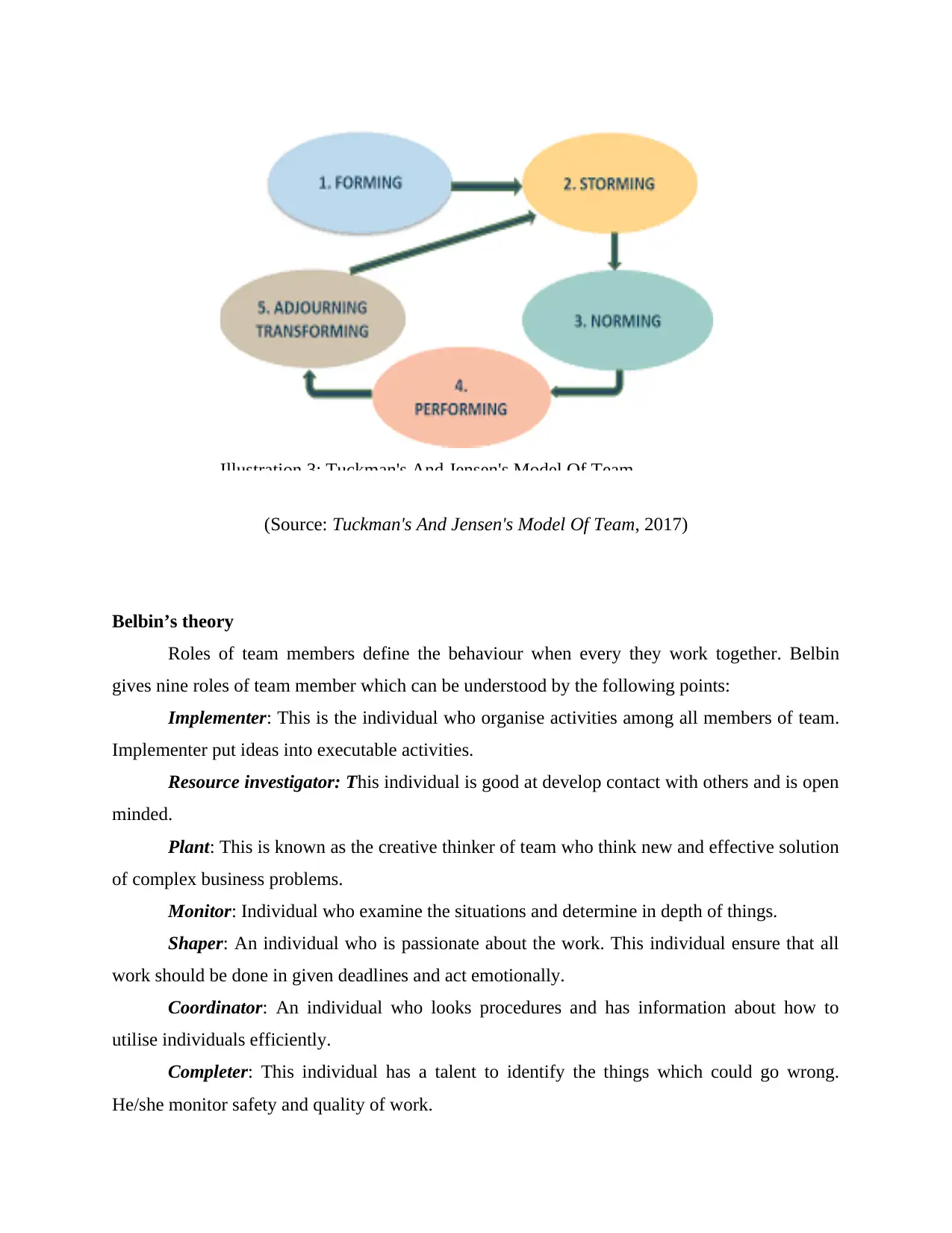
(Source: Tuckman's And Jensen's Model Of Team, 2017)
Belbin’s theory
Roles of team members define the behaviour when every they work together. Belbin
gives nine roles of team member which can be understood by the following points:
Implementer: This is the individual who organise activities among all members of team.
Implementer put ideas into executable activities.
Resource investigator: This individual is good at develop contact with others and is open
minded.
Plant: This is known as the creative thinker of team who think new and effective solution
of complex business problems.
Monitor: Individual who examine the situations and determine in depth of things.
Shaper: An individual who is passionate about the work. This individual ensure that all
work should be done in given deadlines and act emotionally.
Coordinator: An individual who looks procedures and has information about how to
utilise individuals efficiently.
Completer: This individual has a talent to identify the things which could go wrong.
He/she monitor safety and quality of work.
Illustration 3: Tuckman's And Jensen's Model Of Team
Belbin’s theory
Roles of team members define the behaviour when every they work together. Belbin
gives nine roles of team member which can be understood by the following points:
Implementer: This is the individual who organise activities among all members of team.
Implementer put ideas into executable activities.
Resource investigator: This individual is good at develop contact with others and is open
minded.
Plant: This is known as the creative thinker of team who think new and effective solution
of complex business problems.
Monitor: Individual who examine the situations and determine in depth of things.
Shaper: An individual who is passionate about the work. This individual ensure that all
work should be done in given deadlines and act emotionally.
Coordinator: An individual who looks procedures and has information about how to
utilise individuals efficiently.
Completer: This individual has a talent to identify the things which could go wrong.
He/she monitor safety and quality of work.
Illustration 3: Tuckman's And Jensen's Model Of Team
⊘ This is a preview!⊘
Do you want full access?
Subscribe today to unlock all pages.

Trusted by 1+ million students worldwide
1 out of 19
Related Documents
Your All-in-One AI-Powered Toolkit for Academic Success.
+13062052269
info@desklib.com
Available 24*7 on WhatsApp / Email
![[object Object]](/_next/static/media/star-bottom.7253800d.svg)
Unlock your academic potential
Copyright © 2020–2026 A2Z Services. All Rights Reserved. Developed and managed by ZUCOL.





